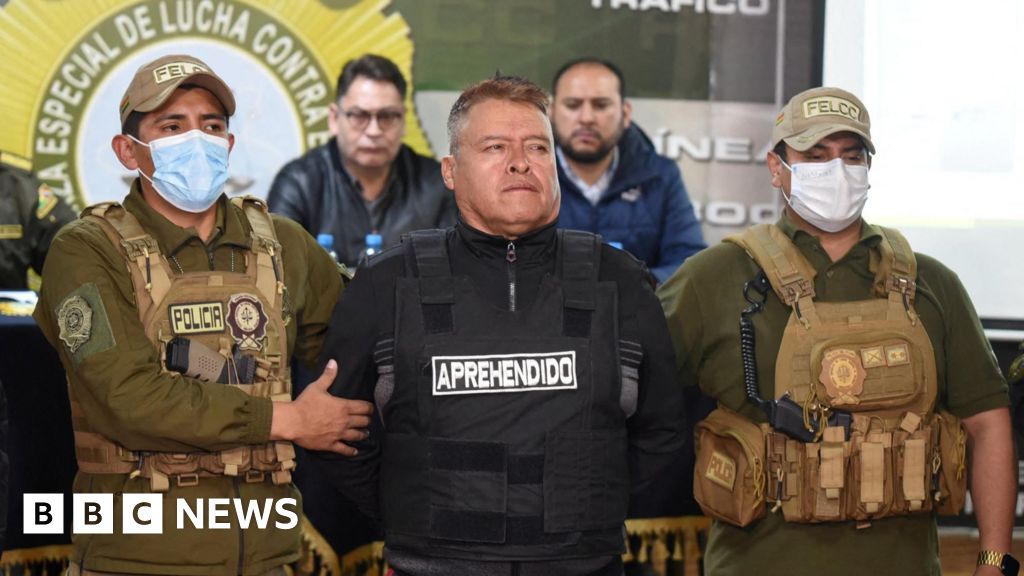Day: June 27, 2024

21 minutes ago
By Will Grant, Mexico, Central America and Cuba Correspondent • Kathryn Armstrong, BBC News • Ido Vock, BBC News
Bolivia’s General Zuniga arrested for coup attempt
Bolivian police have arrested the leader of an apparent attempted coup, hours after the presidential palace in La Paz was stormed by soldiers.
Hundreds of troops and armoured vehicles had taken up position on Murillo Square where key government buildings are located. One armoured vehicle smashed down the main gate of the presidential palace, allowing soldiers to enter. They all later withdrew.
The rebel military leader in charge, Gen Juan José Zúñiga, had said he wanted to “restructure democracy” and that while he respected President Luis Arce for now, there would be a change of government. He was later arrested.
Gen Zúñiga was removed from his role on Tuesday, after he made inflammatory comments about Bolivia’s former president, Evo Morales, during an interview the previous day.
President Arce condemned the coup attempt, calling on the public to “organise and mobilise… in favour of democracy”.
“We cannot allow once again coup attempts to take Bolivian lives,” he said in a televised message to the country from inside the presidential palace.
His words clearly resonated, with pro-democracy demonstrators taking to the streets in support of the government.
In dramatic footage seemingly filmed inside the presidential palace, President Arce could be seen confronting Gen Zúñiga, ordering him to stand down and asking him to vacate the role.
He also announced he was appointing new military commanders, confirming reports that Gen Zúñiga had been dismissed after openly criticising Mr Morales.
Mr Morales, who also condemned the coup attempt, called for criminal charges to be brought against Gen Zúñiga and his “accomplices”.
The public prosecutor’s office has opened a criminal investigation. The head of the Bolivian Navy, Vice-Adm Juan Arnez Salvador, has also ben arrested.
Gen Zúñiga’s exact motivations for launching the coup remain unclear.
He was sacked after appearing on television on Monday, saying he would arrest Mr Morales if he ran for office again next year, despite the former president being barred from doing so.
Mr Morales was forced out of office in 2019 by military chiefs who said he was trying to manipulate the result of a presidential election, sending him into exile in Mexico.
Speaking from Murillo Square after it was taken by troops, he accused an “elite” of taking “over the country, vandals who have destroyed the country.”
But moments before his arrest, the general told reporters that the president had instructed him to get out the “blindados” (armoured vehicles), in a bid to improve his waning popularity. He was bundled into a waiting police van seconds later.
Andrea Barrientos – a leading opposition senator – echoed his claims, suggesting that an economic and judicial crisis had prompted Mr Arce to launch a “self-coup”.
“I will say that the government has a lot of questions to answer to the people of Bolivia, and they need to explain this situation very well,” she added. “We will say that we need a deep investigation about this situation.”
It is increasingly clear that Wednesday’s move this was a short-lived and ill-judged military uprising rather than any wider unravelling of power.
Nevertheless, the coming weeks will be key in establishing whether Gen Zuñiga’s military insurrection was just an isolated incident.
Certainly, the government now looks more vulnerable, and others may try to dislodge Mr Arce’s administration – albeit through politics rather than via the military.
Mr Morales called on his supporters, particularly in the country’s indigenous coca-growers movement, to take to the streets to demand an end to the attempt coup.
That display of popular power may well have helped strengthen the resolve against Gen Zuñiga’s plans, which also included freeing “political prisoners” including former leader Jeanine Áñez.
Both Mr Arce and his predecessor belong to the same political party, despite internal political feuds. Their alliance has led some Bolivians, including Gen Zúñiga, to worry that Mr Morales might seek another term in office.
Concerns come after he tried to bypass the constitution and seek a fourth term in 2019. Mr Morales went on to win the vote, but he was forced to resign and flee the country after violent protests.
The centre-right Jeanine Áñez was the country’s interim leader between 2019-20, but was sentenced to 10 years in jail over what prosecutors say was a coup to oust her predecessor Mr Morales. The incumbent president, Mr Arce, went on to win a re-run vote in 2020.
Formerly allies, Mr Arce and Mr Morales have not seen eye to eye on much recently, but they were united in their condemnation of the use of troops to force political change in Bolivia.
Before Mr Morales took power in 2005, Bolivia was one of the most politically volatile nations in the Americas. His time in power brought much-needed stability to the Andean nation, at least until its ignominious end.
For his part, Mr Arce – who was elected after a period of instability following the 2019 election – will have been heartened by the speed of the regional response.
Close allies like the left-wing governments in Venezuela and Colombia were quick to condemn what was happening and call for democracy to prevail. Washington also called for calm.
In Paraguay, centre-right President Santiago Peña also condemned the attempted coup.
Even those Bolivians who opposed his socialist rule will not want to see a return to a dark time in South America where militaries with terrible human rights records often pushed out the country’s democratically elected leaders at the barrel of a gun.
But Jhanisse Vaca Daza – a human rights activist – said she feared Mr Arce could use the apparent coup as a reason to crack down on his opponents.
“It will legitimise and give (President) Arce’s government more power to arrest new members of the opposition who they deem may be a threat to their governance,” she said.
“The fear for many people that are currently Legislative Assembly members is that this could also lead to either closing the Legislative Assembly or arresting members that may be suspected to have collaborated with the military.”
Watch: Armoured vehicle rams Bolivia’s presidential palace
The post Bolivian police arrest leader of apparent coup attempt first appeared on The News And Times Review – NewsAndTimes.org.
US intelligence failures on China over several decades produced an existential threat from Beijing now confronting America, former Pacific Fleet intelligence director tells Congress https://t.co/fsaQVEtCGz
— Bill Gertz (@BillGertz) June 27, 2024
More than a quarter of Americans now claim no religious affiliation. There’s also a growing political divide within Christian communities as faith has receded.https://t.co/BbpMg8o1se
— PBS News (@NewsHour) June 27, 2024
Egypt, UAE prepared to participate in post-war Gaza security force — officialshttps://t.co/FvMXD8ByjU
— The Times of Israel (@TimesofIsrael) June 27, 2024
Зеленский подпишет соглашение о безопасности Украины на саммите лидеров ЕСhttps://t.co/H9cNd5DR00
— Голос Америки (@GolosAmeriki) June 27, 2024
I accuse the prime minister of Israel of a deliberate attempt to destroy the political-security-military alliance between Israel and the United States. The time has come to expel him / Former PM Ehud Olmerthttps://t.co/OSVelEFhJG
— Haaretz.com (@haaretzcom) June 27, 2024

How can literacy change people’s lives? Beth and Phil discuss this and teach you some useful vocabulary.
TRANSCRIPT
Find a full transcript for this episode and more programmes to help you with your English at:
https://www.bbc.co.uk/learningenglish/english/features/6-minute-english_2024/ep-240627
FIND BBC LEARNING ENGLISH HERE:
Visit our website
✔️ https://www.bbc.co.uk/learningenglish
Follow us
✔️ https://www.bbc.co.uk/learningenglish/followus
LIKE PODCASTS?
Try some of our other popular podcasts including:
✔️ Learning English for Work
✔️ Learning English from the News
✔️ Learning English Stories
They’re all available by searching in your podcast app.
For today’s episode, Lawfare Editor-in-Chief Benjamin Wittes speaks with Katsiaryna Shmatsina, a Belarusian political analyst and think tanker currently on trial for allegedly plotting to overthrow the government. Shmatsina discusses the charges against her, the trial process, and the broader political situation in Belarus. She delves into the history of the Lukashenko regime, its ties with Russia, and the repression of opposition voices. The conversation also covers the 2020 election and the subsequent crackdown on protests. Shmatsina shares her personal experiences with political repression in Belarus, her decision to flee the country, and her life under constant surveillance and fear of being targeted by the authorities. She explains her journey to seek asylum in the United States and her ongoing work in the think tank community.
To receive ad-free podcasts, become a Lawfare Material Supporter at www.patreon.com/lawfare. You can also support Lawfare by making a one-time donation at https://givebutter.com/c/trumptrials.
Support this show http://supporter.acast.com/lawfare.
Hosted on Acast. See acast.com/privacy for more information.
During the Cold War it was taken for granted that Soviet foreign policy was driven by the tenets of Marxism-Leninism toward imperial expansion and subversion. Stalin, Khrushchev, Brezhnev, and even Gorbachev were viewed as ideologues bent on leading their Third World clients to resist U.S. hegemony. In this episode, historians Sergey Radchenko and Vladislav Zubok weigh the role of ideology versus other, more “realist” factors, such as the quest for security and the recognition of the legitimacy of the Kremlin’s interests. The focus of the discussion is Radchenko’s latest book “To Run the World: The Kremlin’s Cold War Bid For Global Power.”
Additional reading:
Collapse: The Fall of the Soviet Union by Vladislav Zubok
